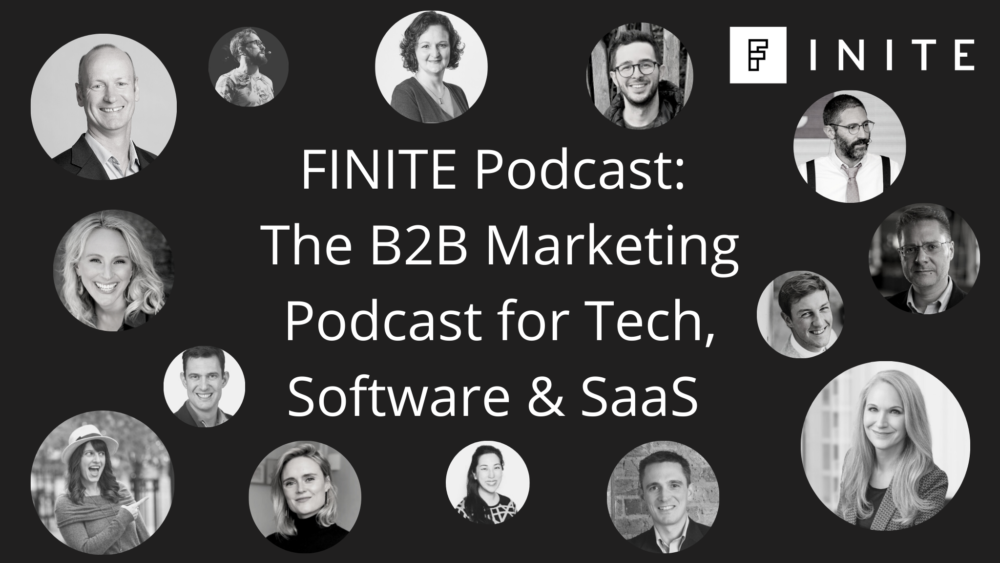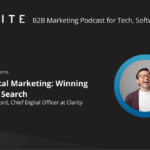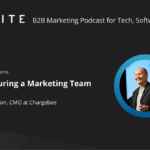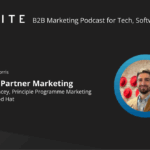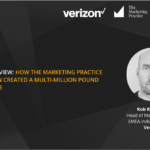We can’t believe its been two years since the very first episode of the FINITE Podcast in 2019 – and what an exciting two years it has been! Whether you’ve been listening to the podcast since it started or if you’ve just found us, thank you for listening and supporting us.
We made the FINITE B2B marketing podcast in response to our community of B2B tech marketers, who wanted a reliable source of useful, actionable content. We aim to provide tactical tips for our FINITE community of B2B tech marketers and beyond.
That’s why in celebration of its 2 year anniversary, we picked out our 10 favourite pieces of advice from the wonderful guests we’ve had on the show. It was no easy feat! All 46 of our episodes to date are filled to the brim with great advice from some of the best B2B tech marketing leaders in the world.
1. Oren Greenburg on balancing brand marketing with performance marketing
On one of our earlier podcasts, Oren gave us research-backed advice on how much a marketer should focus on brand building, and how much they should focus on direct response marketing. This ended up being quite a frequent topic of conversation with guests, as marketers grapple to balance long-term and short-term strategies for growth.
It’s difficult to attribute revenue to activities like brand building, PR and content marketing. It can be tempting to aim for immediate results which prove the value of marketing to key stakeholders. Oren thinks we should make an effort to stay away from this temptation, and thinks brand building should actually take the majority of our time and resources.
“I think there’s a recommended ratio, which ties into the second piece of research that I came across from the IPA, which suggested that you invest 60% into brand and 40% into direct response. I think that’s a really nice, healthy split in terms of your thinking of your budget and resource allocation to try and get the best of both of those worlds.”
Oren Greenburg
Listen to the episode here!
2. April Dunford on positioning for B2B companies in uncertain times
We were lucky enough to have renowned marketing speaker April Dunford on the podcast in 2020. It was a wild year but April had grounding advice. As an expert in positioning, April told us how marketers should adjust their focus during a downturn by responding to customer needs first.
April advised us to get all hands on deck in shifting messaging for customers, and shifting business objectives from growth to retention:
“Positioning is not a static thing. It does change over time and it doesn’t mean you can’t change it a year from now. But if it’s going to be a year, then I need all hands on deck with this. I need to build new sales materials, I need to get my sales people trained to deliver this new message and this new reality so that we’re relevant to a new set of customers. The second thing is if I was hearing from my existing customer base again… I would absolutely be looking at whether or not I’ve got a serious risk of churn in my existing customer base and if that’s so then I would be redirecting a significant amount of my budget from growth related things to retention related things.“
April Dunford
Listen to the episode here!
3. Matthieu Baril on the role of the Marketing Operations team
With the rise MarTech comes the rise of marketing operations. In larger organisations, an entire team can be dedicated to ensuring the smooth sailing of the overall marketing function. Even in smaller organisations and startups, some recommend that marketing ops be the first hire!
Matthieu Baril is a marketing operations professional who gave us his unique perspective on the role of marketing ops. He suggested that the main focus of marketing ops be on maintaining the internal processes of the rest of the marketing team. Whether this be through training or implementing automation, internal processes are crucial to marketing success.
“So when I think about the remit of the marketing operations team, I think one of the remits is to actually train the rest of the team on how work should get done within the team. Right? So, in particular, when I think about the different areas that marketing operations takes care of, the first one that comes to mind is internal processes.”
Matthieu Baril
Listen to the episode here!
4. Clemens Deimann on standing out amongst a flood of virtual events
In our 2021 B2B tech marketing trends research report, we found that 44% of B2B tech marketers think their biggest challenge going into 2021 is tackling ‘digital fatigue’. With the outbreak of COVID-19 moving the marketplace online, audiences became tired of digital events like webinars.
On our timely podcast about demand generation, Clemens Deimann gave us his insights into standing out amongst the crowd to attract B2B tech audiences. Alex asked how to stand out amongst a flood of virtual events, to which Clemens responded with a message of relevance and niching down:
“I think one thing that makes sense in this time is to, instead of making your events about geographies, break down your audience and hyper-focus on different segments of your audience and speak directly to them with their problems in their language. I think the targeting or becoming more niche and targeted will increase your relevance.”
Clemens Deimann
Listen to the episode here!
5. Ashley Gatehouse on communicating to the C-Suite
As a marketing leader, it is of vital importance to communicate the successes and needs of marketing to the C-Suite. This will help you to gain financial investment and support from key stakeholders.
Ashley Gatehouse gave us some great advice on what to prioritise when going into a C-level board meeting. This comes side-by-side with marketing attribution, in which he claims you should always measure what matters. With the amount of attribution tools on the market these days, you have no excuse not to!
“Your challenge as a marketing leader is to define what are the three or four key things that in the C level board discussions, will allow you to draw lines between those things and the key financial statements and projections. And that is part art, part science, and it is at the cornerstone of your ability to be successful in a CMO board level.“
Ashley Gatehouse
Listen to the full episode here!
6. Rory Sutherland on decision making psychology
Rory Sutherland is the Vice-Chairman of Ogilvy, where he co-founded a behavioural science practice. Now, Rory is a well-known marketing speaker who gave us helpful tips on marketing to a B2B tech buyer.
Rory let it be known that B2B buyers still respond to the same pressure of B2C buyers, with an emphasis on avoiding risks to their personal careers. Rory gave us an insight into one of the key factors in buyer decision making:
“And bluntly put when a consumer buys something, the emotion he’s trying to avoid, and this is very important by the way, we’re much more driven in many ways by aversion than we are by desire. Not always, if we’re in a hot state, you know, this is why people who are sexually aroused or pissed will do totally bonkers things. But by and large, we’re driven by fear more than we’re driven by greed in a sense.”
Rory Sutherland
Listen to the full episode here!
7. Emmy Granström on marketing with a limited budget
Not every marketer has a large amount of financial backing and a big team to support them. Sometimes, marketers are in small organisations, start-ups and solo teams. We had Emmy Granström on the podcast to teach us her tips to competing with a limited budget.
The overarching theme of the podcast was maintaining measurability to understand which campaigns work best and to limit the risk of investments. Emmy gave us the great advice of sticking to a plan and measuring new ideas against larger marketing objectives.
“So what I found helpful with prioritising is making sure I always have a well-defined plan annually and quarterly because annually at the beginning of each year, we do a plan. But then that changes as we progress through the year. But when someone comes up with a brilliant idea, measure it against that plan and say, will it help me achieve my goals?”
Emmy Granström
Listen to the full episode here!
8. Rand Fishkin on what you should do instead of product-market fit
Rand Fishkin is well known for rejecting the concept of product-market fit and the value that VCs tend to see in it. Rand thinks product-market fit generates unnecessary cut-offs in segments, which can limit your audience scope and stop companies from targeting a wide range of prospects.
Rand proposes an alternative approach. One that requires vigorous testing on multiple groups and seeing how they respond to your marketing as you grow. Listen to the episode to hear his full process, but here’s the start:
“So the concept that I presented around this customer adoption spectrum is that any given customer group for your product has some describable traits that separate them from other groups of customers, and that correlate with how much they like your product and how much traction you’re getting with them. And they predict how much they need your product, the value they’re getting and their behaviour…
And then you’re going to say, how are we doing with group a? Are we doing pretty well? Is group a, a big market size? Do they have brand awareness of us already? What’s their conversion rate or success rate? Or how much are they buying the product and sticking with it and are they referring other people to it? All those kinds of things.”
Rand Fishkin
Listen to the full episode here!
9. Angela Lee on taking it slow when starting ABM
ABM is becoming more and more popular for B2B tech marketers. This is largely due to technological improvements in data collection, the attraction of enterprise accounts and more conversation within the industry about the benefits of ABM.
We jumped onto the ABM train with a fantastic episode with Angela Lee – an expert in ABM from LinkedIn. Angela gave us sound advice about the preparation you need before you rush into targeting. Prepare your content, approach and long-term plan first.
“One tip I can offer to the audience is you may get pressured to have to start right away. It’s like, we need to start ABM right now. Like this month, we need to get an ABM program going, and I’ve definitely been in those situations. But what I’ve found is that I wished I had pushed back a little bit more and said, actually I need another couple of weeks to really nail down the plan because it just makes your life a lot easier and more streamlined if you get all of the questions answered ahead of time, everything aligned ahead of time, all the content created ahead of time.”
Angela Lee
Listen to the full episode here!
10. Arthur Nobel on preparing marketing for each funding round
One of the more recent episodes we’ve done is about marketing from the perspective of a VC. Arthur Nobel is a Principal at Knight Capital, an investment firm that specialises in B2B SaaS companies.
Arthur talked a lot about risk aversion, and how he as an investor makes his decisions based on risk. He gave us one big, practical tip for preparing marketing for a VC:
“If you’re approaching funding, I would just write down all the risks that you could think of. And then just come up with an answer on how you mitigate that. Or whether it’s it’s truly a risk, but there is also a very nice upside to it.”
Arthur Nobel
Listen to the full episode here!
Hope you enjoyed our top 10 tips! Make sure to subscribe to the FINITE Podcast on Spotify or Apple Podcasts so you never miss an episode.
For more information about the FINITE Podcast, head here!
